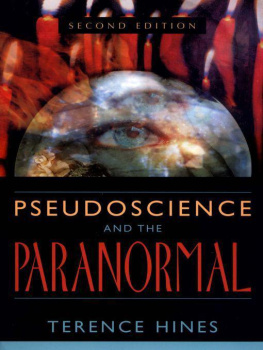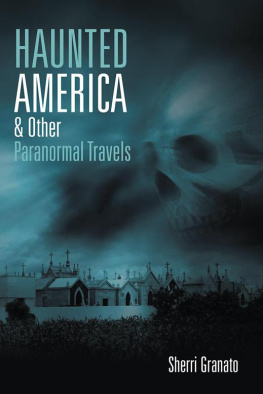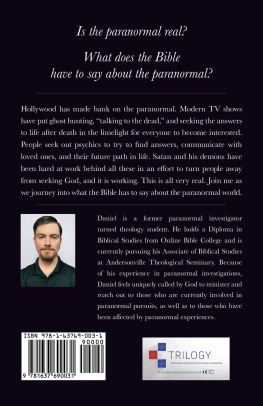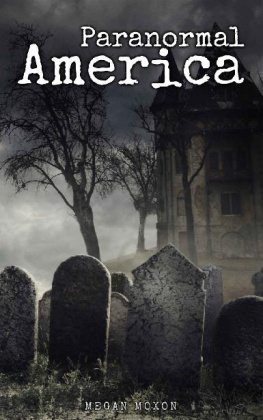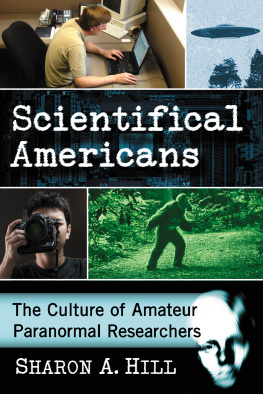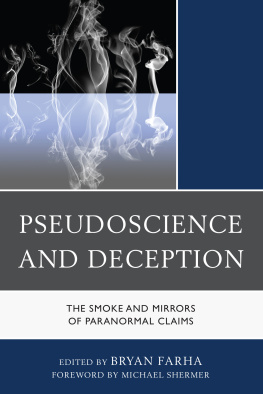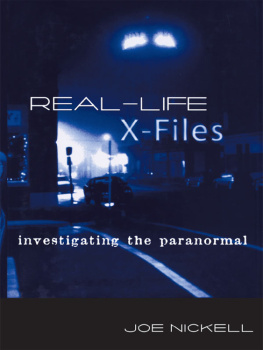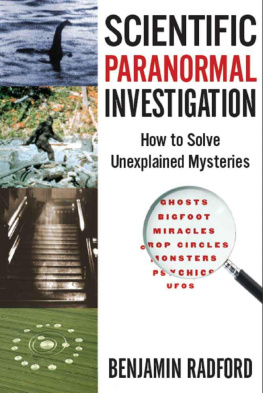Table of Contents
Published 2003 by Prometheus Books
Pseudoscience and the Paranormal . Copyright 2003 by Terence Hines. All rights reserved. No part of this publication may be reproduced, stored in a retrieval system, or transmitted in any form or by any means, digital, electronic, mechanical, photocopying, recording, or otherwise, or conveyed via the Internet or a Web site without prior written permission of the publisher, except in the case of brief quotations embodied in critical articles and reviews.
Inquiries should be addressed to
Prometheus Books
59 John Glenn Drive
Amherst, New York 14228-2197
VOICE: 716-691-0133, ext. 207
FAX: 716-564-2711
WWW.PROMETHEUSBOOKS.COM
07 06 05 5 4 3 2
Library of Congress Cataloging-in-Publication Data
Hines, Terence.
Pseudoscience and the paranormal / Terence Hines.2nd ed. p. cm.
Includes bibliographical references and indexes.
ISBN 1-57392-979-4 (pbk. : alk. paper)
1. Parapsychology. 2. Occultism. 3. Unidentified flying objects. I. Title.
BF1042 .H55 2002
133dc21
2002068086
Printed in the United States of America on acid-free paper
This book is dedicated with love to
my daughter
Clare Rose Hines,
who brings me more joy than I could ever have imagined;
her mother,
Mary Ruth Dolson;
and her grandparents,
Jessie Rose Stevens Dolson (1935-1997)
and
Roger J. Dolson Sr. (1932-2003)
PREFACE
T he first edition of Pseudoscience and the Paranormal appeared in 1988. Much has changed in the area of paranormal claims and beliefs since then, but much has also remained the same. To reflect this, two new chapters have been added to the present book. One chapter covers alternative medicine and replaces that on health and nutrition quackery from the 1988 book. Chapter 12 covers the actual science of several of the various hysterical responses that have broken out over alleged environmental health hazards such as power lines, PCBs and cell phone radiation. The chapter previously titled Psychoanalysis has been renamed Pseudopsychology to reflect the fact that psychoanalysis is far from the only quack psychotherapy out there. The other chapters have been updated and expanded as needed. As in the 1988 book, I have heavily referenced the text so that readers who would like to read more on a particular topic will be able to find the relevant primary sources with ease.
As with any book, this was not a project I completed alone. I would like to thank numerous friends and colleagues who helped in many ways, among them by answering questions and tracking down obscure publications. The Interlibrary Loan staff at the Mortola Library on Pace Universitys Pleasantville, New York, campus was especially helpful in tracking down often obscure articles. Of course, any errors are mine alone.
Terence Hines
CHAPTER 1
THE NATURE OF PSEUDOSCIENCE
W hat is pseudoscience? Its difficult to come up with a strict definition. In the real world things are not clearly delineated but surrounded by gray areas that doom any hard definition. As the term implies, a pseudoscience is a doctrine or belief system that pretends to be a science. What distinguishes pseudoscience from real science? Radner and Radner (1982) and MacRobert (1986) have discussed criteria for separating real science from pseudoscience and for helping to decide whether a new claim is pseudoscientific.
The most common characteristic of a pseudoscience is the nonfalsifiable or irrefutable hypothesis. This is a hypothesis against which there can be no evidencethat is, no evidence can show the hypothesis to be wrong. It might at first seem that such a hypothesis must be true, but a bit of reflection and several examples will demonstrate just the opposite. Consider the following hypothesis: I, Terence Michael Hines, am God incarnate, and I created the universe thirty seconds ago. Now, you probably dont believe this hypothesis, but how would you go about disproving it? You could argue, You say you created the universe thirty seconds ago, but I have memories from years ago. So, youre not God. But I reply, When I created the universe, I created everyone complete with memories. We could go on like this for some time and you would never be able to prove that Im not God. Nonetheless, this hypothesis is clearly absurd!
Creationists, who believe that the biblical story of creation is literal truth, often adopt a similar irrefutable hypothesis. They claim that the world was created less than ten thousand years ago. As will be seen in chapter 13, vast amounts of physical evidence clearly refute this claim. All one has to do is point to something older than ten thousand years. Backed into a corner by such evidence, creationists often rephrase the creationist hypothesis in an irrefutable form. They explain the clear geological and fossil evidence that dates back millions of years by claiming that God put that evidence there to test our faith. An alternative version is that the evidence was manufactured by Satan to tempt us from the true path of redemption. No evidence can refute either of these versions of the hypothesis, since any new piece of geological or fossil evidence can be dismissed as having been placed there by God or Satan. This does not make the hypothesis trueit just makes it nonfalsifiable. Such a hypothesis contributes nothing to our understanding of the physical world.
Another example of an irrefutable hypothesis comes from a doctrine not usually considered a pseudoscience (but which meets the criteria, as will be seen in chapter 5)-psychoanalysis. Sigmund Freud believed that all males had latent homosexual tendencies, but that in most males these tendencies were repressed. Clearly, homosexual males have homosexual tendencies. But what about heterosexual males? To determine whether the hypothesis that all males have repressed homosexual tendencies is false, you could give some sort of test for homosexual tendencies. What if you failed to find such tendencies? The standard Freudian reply is that the tendencies have been so completely repressed that they dont show up on the test. Given this irrefutable hypothesis, no test could show that heterosexual males dont have latent homosexual urges. No matter how sensitive the test, the reply can always be made that the urges are so deeply repressed that they dont show up on the test.
Those who are skeptical about pseudoscientific and paranormal claims are frequently accused of being closed-minded in demanding adequate evidence and proof before accepting such a claim. But who is really being closed-minded? As a scientist, I can specify exactly the type of evidence that would be required to make me change my mind and accept the reality of astrology, UFOs as extraterrestrial spacecraft, or any other topic considered in this book. But the believer, who likes to paint him or herself as open-minded and accepting of new possibilities, is actually extremely closed-minded. After all, the irrefutable hypothesis is really saying There is no conceivable piece of evidence that will cause me to change my mind! This is true closed-mindedness.
One more point should be made about irrefutable hypotheses: Although they are nonfalsifiable, they are not nonverifiable. That is, they could be shown to be true. The Freudian hypothesis about males latent homosexual urges could be verified if all males did show such urges on some sensitive test of sexual preferences. So, irrefutable hypotheses are only thatirrefutable. They could be verified, if the evidence to support the hypothesis existed. Of course, the promoters of irrefutable hypotheses have been forced to fall back on them precisely because no evidence exists to support them. Thus, an irrefutable hypothesis is a surefire sign of a pseudoscience.

